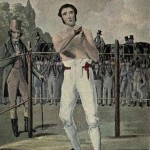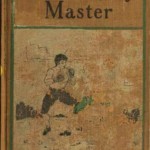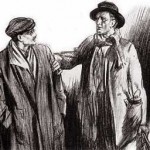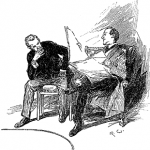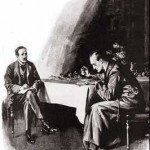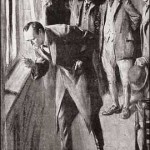Then the pent-up passion of the great assembly broke loose. Croxley gave a deep groan of disappointment. The Wilsons were on their feet, yelling with delight. There was still a chance for them. In four more seconds their man would have been solemnly counted out. But now he had a minute in which to recover. The referee looked round with relaxed features and laughing eyes. He loved this rough game, this school for humble heroes, and it was pleasant to him to intervene as a Deux ex machinâ at so dramatic a moment. His chair and his hat were both tilted at an extreme angle; he and the timekeeper smiled at each other. Ted Barton and the other second had rushed out and thrust an arm each under Montgomery’s knee, the other behind his loins, and so carried him back to his stool. His head lolled upon his shoulder, but a douche of cold water sent a shiver through him, and he started and looked round him.
“He’s a’ right!” cried the people round. “He’s a rare brave lad. Good lad! Good lad!” Barton poured some brandy into his mouth. The mists cleared a little, and he realized where he was and what he had to do. But he was still very weak, and he hardly dared to hope that he could survive another round.
“Seconds out of the ring!” cried the referee. “Time!”
The Croxley Master sprang eagerly off his stool.
“Keep clear of him! Go easy for a bit,” said Barton, and Montgomery walked out to meet his man once more.
He had had two lessons—the one when the Master got him into his corner, the other when he had been lured into mixing it up with so powerful an antagonist. Now he would be wary. Another blow would finish him; he could afford to run no risks. The Master was determined to follow up his advantage, and rushed at him, slogging furiously right and left. But Montgomery was too young and active to be caught. He was strong upon his legs once more, and his wits had all come back to him. It was a gallant sight—the line-of-battleship trying to pour its overwhelming broadside into the frigate, and the frigate manœuvring always so as to avoid it. The Master tried all his ring-craft. He coaxed the student up by pretended inactivity; he rushed at him with furious rushes towards the ropes. For three rounds he exhausted every wile in trying to get at him. Montgomery during all this time was conscious that his strength was minute by minute coming back to him. The spinal jar from an upper-cut is overwhelming, but evanescent. He was losing all sense of it beyond a great stiffness of the neck. For the first round after his downfall he had been content to be entirely on the defensive, only too happy if he could stall off the furious attacks of the Master. In the second he occasionally ventured upon a light counter. In the third he was smacking back merrily where he saw an opening. His people yelled their approval of him at the end of every round. Even the iron-workers cheered him with that fine unselfishness which true sport engenders. To most of them, unspiritual and unimaginative, the sight of this clean-limbed young Apollo, rising above disaster and holding on while consciousness was in him to his appointed task, was the greatest thing their experience had ever known.
But the Master’s naturally morose temper became more and more murderous at this postponement of his hopes. Three rounds ago the battle had been in his hands; now it was all to do over again. Round by round his man was recovering his strength. By the fifteenth he was strong again in wind and limb. But the vigilant Anastasia saw something which encouraged her.
“That bash in t’ ribs is telling on him, Jock,” she whispered. “Why else should he be gulping t’ brandy? Go in, lad, and thou hast him yet.”
Montgomery had suddenly taken the flask from Barton’s hand, and had a deep pull at the contents. Then, with his face a little flushed, and with a curious look of purpose, which made the referee stare hard at him, in his eyes, he rose for the sixteenth round.
“Game as a pairtridge!” cried the publican, as he looked at the hard-set face.
“Mix it oop, lad; mix it oop!” cried the iron-men to their Master.
And then a hum of exultation ran through their ranks as they realized that their tougher, harder, stronger man held the vantage, after all.
Neither of the men showed much sign of punishment. Small gloves crush and numb, but they do not cut. One of the Master’s eyes was even more flush with his cheek than Nature had made it. Montgomery had two or three livid marks upon his body, and his face was haggard, save for that pink spot which the brandy had brought into either cheek. He rocked a little as he stood opposite his man, and his hands drooped as if he felt the gloves to be an unutterable weight. It was evident that he was spent and desperately weary. If he received one other blow it must surely be fatal to him. If he brought one home, what power could there be behind it, and what chance was there of its harming the colossus in front of him? It was the crisis of the fight. This round must decide it. “Mix it oop, lad; mix it oop!” the iron-men whooped. Even the savage eyes of the referee were unable to restrain the excited crowd.
Now, at last, the chance had come for Montgomery. He had learned a lesson from his more experienced rival. Why should he not play his own game upon him? He was spent, but not nearly so spent as he pretended. That brandy was to call up his reserves, to let him have strength to take full advantage of the opening when it came. It was thrilling and tingling through his veins, at the very moment when he was lurching and rocking like a beaten man. He acted his part admirably. The Master felt that there was an easy task before him, and rushed in with ungainly activity to finish it once for all. He slap-banged away left and right, boring Montgomery up against the ropes, swinging in his ferocious blows with those animal grunts which told of the vicious energy behind them.
But Montgomery was too cool to fall a victim to any of those murderous upper-cuts. He kept out of harm’s way with a rigid guard, an active foot, and a head which was swift to duck. And yet he contrived to present the same appearance of a man who is hopelessly done. The Master, weary from his own shower of blows, and fearing nothing from so weak a man, dropped his hand for an instant, and at that instant Montgomery’s right came home.
It was a magnificent blow, straight, clean, crisp, with the force of the loins and the back behind it. And it landed where he had meant it to—upon the exact point of that blue-grained chin. Flesh and blood could not stand such a blow in such a place. Neither valour nor hardihood can save the man to whom it comes. The Master fell backwards, flat, prostrate, striking the ground with so simultaneous a clap that it was like a shutter falling from a wall. A yell which no referee could control broke from the crowded benches as the giant went down. He lay upon his back, his knees a little drawn up, his huge chest panting. He twitched and shook, but could not move. His feet pawed convulsively once or twice. It was no use. He was done. “Eight—nine—ten!” said the timekeeper, and the roar of a thousand voices, with a deafening clap like the broadside of a ship, told that the Master of Croxley was the Master no more.

